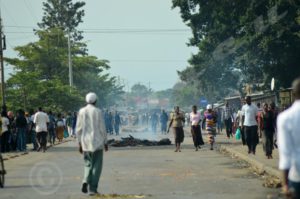Some residents of the Cibitoke neighborhood, referred to as anti-President Nkurunziza say they do not feel safe when they are in Kamenge, a so-called pro-government neighborhood. Same feeling for some people from Kamenge. They ask for immediate actions to get them united to overcome fear and prejudices.

Barricades erected in the street of Cibitoke Zone during demonstration against the reelection of Burundi President in 2015
Burundi has experienced a crisis since April 2015 when the ruling CNDD-FDD officially announced the re-election of President Pierre Nkurunziza in the 2015 elections which he won in July. Some members of the opposition and civil society gathered in the so called campaign ‘Halt to the Third Term of Pierre Nkurunziza’ staged demonstrations to protest against Nkurunziza’s re-election accusing him of violating the constitution.
The demonstrations took place in some neighborhoods of the capital Bujumbura and in some localities in the country. Since then, residents of so-called anti-Nkurunziza neighborhoods namely Cibitoke and those living in pro-Nkurunziza areas like Kamenge do not trust each other. Although there is no apparent confrontation between them, each group is afraid of the other. “We go to Kamenge neighborhood fearfully,” say some residents of Cibitoke area.
Jean Claude Nkeshimana, a young student from 4th Avenue in Cibitoke neighborhood, says he has never been threatened by the residents of Kamenge because he lives in Cibitoke. However, he says he cannot go to Kamenge after 6p.m. “I often go to Kamenge market, but I cannot set foot there at night. When one is not known by at least one member of the ruling party, they risk being considered a spy, “says Nkeshimana.
A mother from 16th Avenue in Mutakura area, Cibitoke neighborhood, says she has forbidden her two sons from ever frequenting bars in Kamenge neighborhood from 6 p.m. “I do not trust Kamenge inhabitants since they were the ones who came to arrest the young people of Mutakura who participated in the demonstrations against president Nkurunziza. Who knows they don’t still hold a grudge against us?”she says.
Archard Mutoni, a habitant from 8th Avenue in Mutakura, finds that the fact that the police officers accuse the people from Mutakura of illegally possessing weapons shows that they are considered as political opponents.
“This is a sign that we are not safe. Our neighbors in Kamenge, whose majority are members of the ruling party, still consider us as their enemies, “he says.
Frank Nkurunziza, a young man from Mirango area in Kamenge neighborhood, says he has no problem with the residents of Cibitoke neighborhood. “If I’m in Cibitoke, I feel like home, “he says.
David Kwizera has an opposite impression. For him, there is still a long way to go to restore trust among Cibitoke and Kamenge residents.
As for the local administrator, he reassures that no inhabitant of Kamenge is being abused in Cibitoke.
No case of residents of Kamenge who were mistreated in other localities has been recorded and I have not received any complaints from a Cibitoke resident abused once in Kamenge so far. “They are all brothers, they have to overcome fear,” says the chief of Mutakura neighborhood, in Cibitoke Zone.
Peace activities can help overcome fear and prejudices
Nkeshimana believes that Burundian authorities and their partners should think about initiating activities that can bring together people from various neighborhoods.
He gave the example of a project initiated by Coalition for Peace in Burundi (COPA) jointly with the UNDP. The project started in November 2016 and ended in January 2017. This project aimed at cleaning the streets and alleys of Bujumbura neighborhoods. After the cleaning work, the young people followed teachings on peace and patriotism and they played friendly football matches. This project covered Musaga, Cibitoke, Mutakura, Kamenge and Ngagara neighborhoods. “It was an opportunity for us to get together and talk to each other face to face,” says Nkeshimana.
He regretted that the project did not last longer. He calls on the government to initiate other similar projects through which residents will overcome fear and prejudices,” he says.
Eric Hakizimana, Former executive secretary of a local organization-Action for Peace, calls on the Government and its partners to promote intercommunity exchange spaces to allow people from different political affiliations to get together.
For him, young people are twice actors and victims of conflicts and pillars for the peace consolidation. He finds that young Burundians need more socio-professional guidance to avoid being manipulated politically.



















 IWACU Open Data
IWACU Open Data

